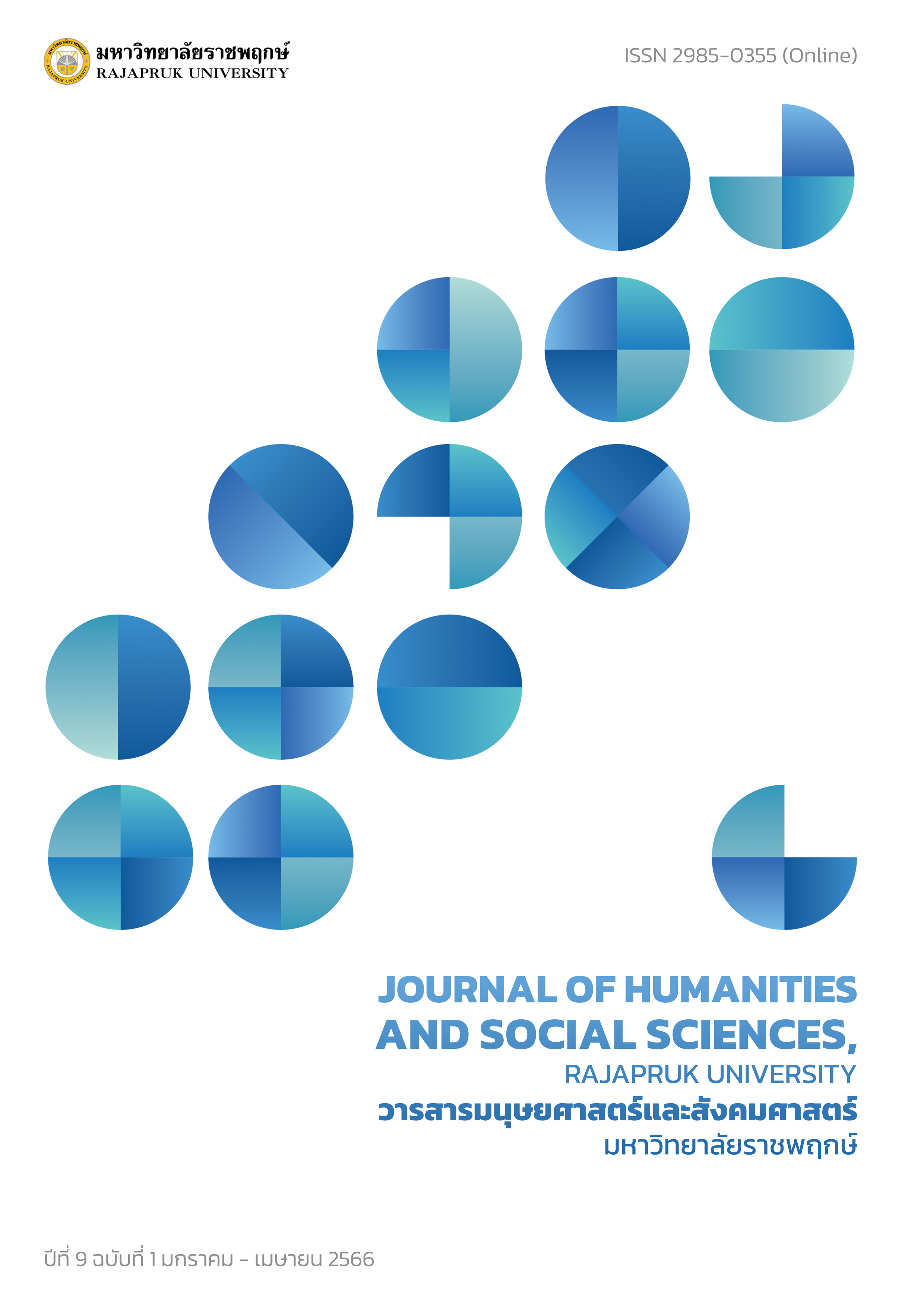The Development Guidelines on Local Wisdom Scholar for Promote Community-Based Tourism at Rong Wua Daeng San Kamphaeng Chiang Mai Province
Main Article Content
Abstract
The purposes of this study were; 1) to study the context of local scholars to promote Community-based Tourism, 2) to study the process of local scholars in transferring local wisdom to strengthen communities, and 3) to give a guideline for the potential development of local scholars to promote Community-based Tourism at Rong Wua Daeng San Kamphaeng Chiang Mai Province. This study was a qualitative method integrated with a documentary, focus group discussions, and an in-depth interview method. The population of this research was purposely selected consisting of local scholars, community leaders, monks, government representatives, students, and people with a grand amount of 75 people. Data analysis using descriptive statistics and then presented with descriptive writing. The results revealed that; 1) context of local scholars for promoting Community-based Tourism at Rong Wua Daeng was found that there were 5 main points: (1) a social knowledge source; (2) a cultural leader and the way of life in the community; (3) a transferring knowledge to the community; (4) being an innovator from wisdom, and (5) a role player in the community's strengthening process in terms of beliefs, practices, traditions, rituals, livelihoods and folk nutrition, folk health care, folk technology, and biodiversity management, 2) the process of transferring wisdom with lectures oral telling, demonstrations, real practice, the use of media for the self-learning process, the transmission through folk performances and local traditions including recording the body of knowledge in textbooks, and 3) guidelines for developing the potential of local philosophers in promoting community-based tourism in Rong Wua Daeng Sub-district, San Kamphaeng District Chiang Mai Province (1) Skill Potential Development (2) Knowledge Potential Development (3) Personality Potential Development.
Article Details
References
ไกรสร มหาวรรณ. (7 กรกฎาคม 2564). สัมภาษณ์. กำนันตำบลร้องวัวแดง.
ทรงกต แสงกันทะ. (12 กรกฎาคม 2564). สัมภาษณ์.ตัวแทนกลุ่มหนุ่มสาว หมู่ 7 ตำบลร้องวัวแดง.
นภาวรรณ เนตรประดิษฐ์ และคณะ. (2564). รูปแบบกิจกรรมพื้นบ้านแบบมีส่วนร่วมของชุมชนคนลำปางเพื่ออนุรักษ์และสืบสานวัฒนธรรมผ่านวิถีการท่องเที่ยวเชิงสร้างสรรค์: บ้านสบลืน.วารสารมนุษยศาสตร์และสังคมศาสตร์ มหาวิทยาลัยราชพฤกษ์, 7(2) พฤษภาคม–สิงหาคม 2564: 47–63.
นิเทศ สนั่นนารี และคณะ. (2563). โสเหล่เสวนา: บทบาทปราชญ์ชาวบ้านในการถ่ายทอดภูมิปัญญาท้องถิ่นเพื่อสร้างความเข้มแข็งชุมชน. วารสารบัณฑิตศึกษามหาจุฬาขอนแก่น,.7(4) ตุลาคม–ธันวาคม: 265–282.
พจนา สวนศรี. (2546). คู่มือการจัดการท่องเที่ยวโดยชุมชน. กรุงเทพฯ: โครงการท่องเที่ยวเพื่อชีวิตและธรรมชาติ.
พระครูพิศาลเจติยารักษ์. (2 พฤษภาคม 2564). สัมภาษณ์. เจ้าอาวาสวัดน้ำจำ ตำบลร้องวัวแดง.
พระครูวิมลญาณประยุต (ดร). (25 พฤษภาคม 2564). สัมภาษณ์. เจ้าอาวาสวัดร้องวัวแดง เจ้าคณะอำเภอสันกำแพง.
มนัสสินี บุญมีศรีสง่า และคณะ. (2556). ปัจจัยที่ส่งผลต่อความพึงพอใจและพฤติกรรมของนักท่องเที่ยวชาวไทย ที่มีต่อตลาดฉัตรศิลาในอำเภอหัวหิน จังหวัดประจวบคีรีขันธ์. Veridian E-Journal, SU กลุ่มมนุษยศาสตร์และสังคมศาสตร์, 6(1): 648-660.
รุจิรา พลแพงขวา และคณะ. (2561). การพัฒนาบุคลากรด้านอุตสาหกรรมการท่องเที่ยวและบริการในจังหวัดอุดรธานีเพื่อเพิ่มขีดความสามารถในการแข่งขัน. วารสารวิทยาลัยบัณฑิตเอเชีย, 8(1): 10-17.
วีระพล ทองมา. (2559). การท่องเที่ยวโดยชุมชน (Community Based Tourism: CBT) สำหรับการพัฒนาคุณภาพชีวิตของชุมชนในเขตที่ดินป่าไม้. ค้นเมื่อวันที่ 12 ธันวาคม 2563, จาก www.dnp.go.th/fca16/file/i49xy4ghqzsh3j1.doc
สมบูรณ์ ฟองนวล. (2 กรกฎาคม 2564). สัมภาษณ์. ผู้อำนวยการโรงเรียนวัดร้องวัวแดงศรีจันทร์วิทยาคาร ตำบลร้องวัวแดง.
สินธุ์ สโรบล. (2546). การท่องเที่ยวโดยชุมชนแนวคิดและประสบการณ์พื้นที่ภาคเหนือ. โครงการประสานงานวิจัยและพัฒนาเครือข่ายการท่องเที่ยวและชุมชน. สำนักงานกองทุนสนับสนุนการวิจัย (สกว.).
อรพิน ปิยะสกุลเกียรติ และคณะ. (2561). บทบาทของปราชญ์ชาวบ้านในการจัดการตนเองของชุมชน. วารสารเกษมบัณฑิต, 19(ฉบับพิเศษ) มีนาคม 2561: 218-230.
อรลัชชา ศิวรักษ์ และคณะ. (2559). คู่มือสำหรับฝึกอบรมชุมชนท่องเที่ยว. กรุงเทพฯ: กรมท่องเที่ยว. วนิดาการพิมพ์.
อาภร ตุ้ยแสง. (5 มิถุนายน 2564). สัมภาษณ์. ประธานกลุ่มน้ำพริกตาแดง หมู่ 2 ตำบลร้องวัวแดง.
อุรา พิศแสวง. (10 มิถุนายน 2564). สัมภาษณ์. ประธานชมรมสตรีแม่บ้านหมู่ 7 ตำบลร้องวัวแดง.
โอฬาร อินทนนท์. (2564). (2 กรกฎาคม 2564). สัมภาษณ์. ผู้ใหญ่บ้าน หมู่ 4 ตำบลร้องวัวแดง.
Dodds, R., Ali, A. & Galaski, K. (2018). Mobilizing knowledge: determining key elements for success and pitfalls in developing community-based tourism. Current Issues in Tourism, 21(13): 1547-1568.
Zapata, M. J., Hall, C. M., Lindo, P. & Vanderschaeghe, M. (2011). Can community-based tourism contribute to development and poverty alleviation? Lessons from Nicaragua. Current Issues in Tourism, 14(8): 725-749.


